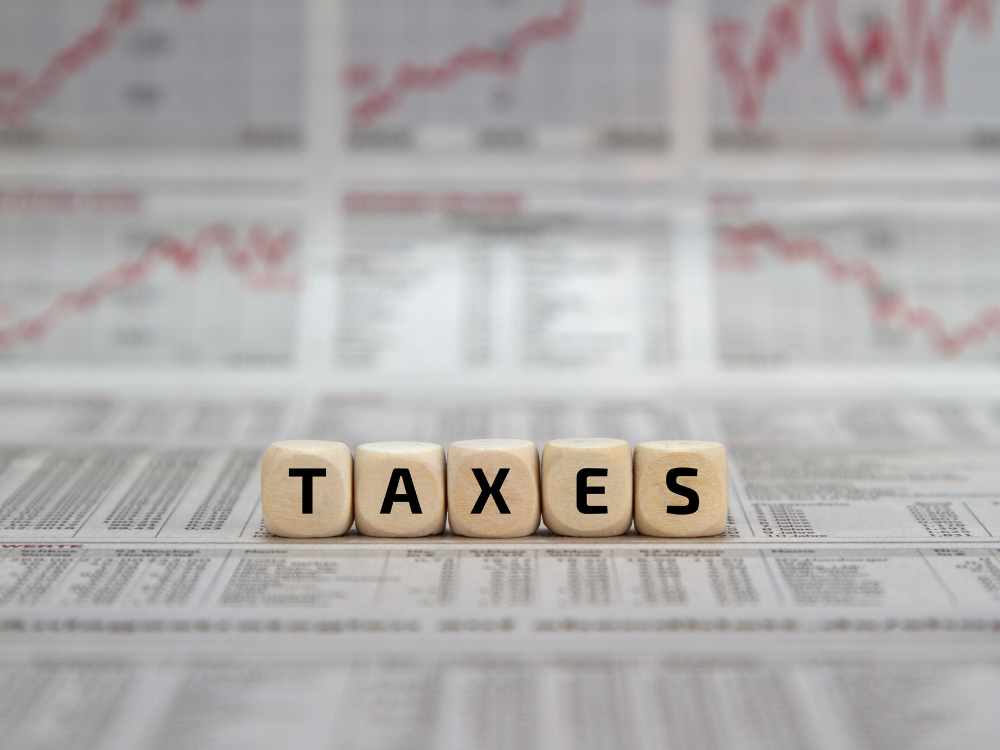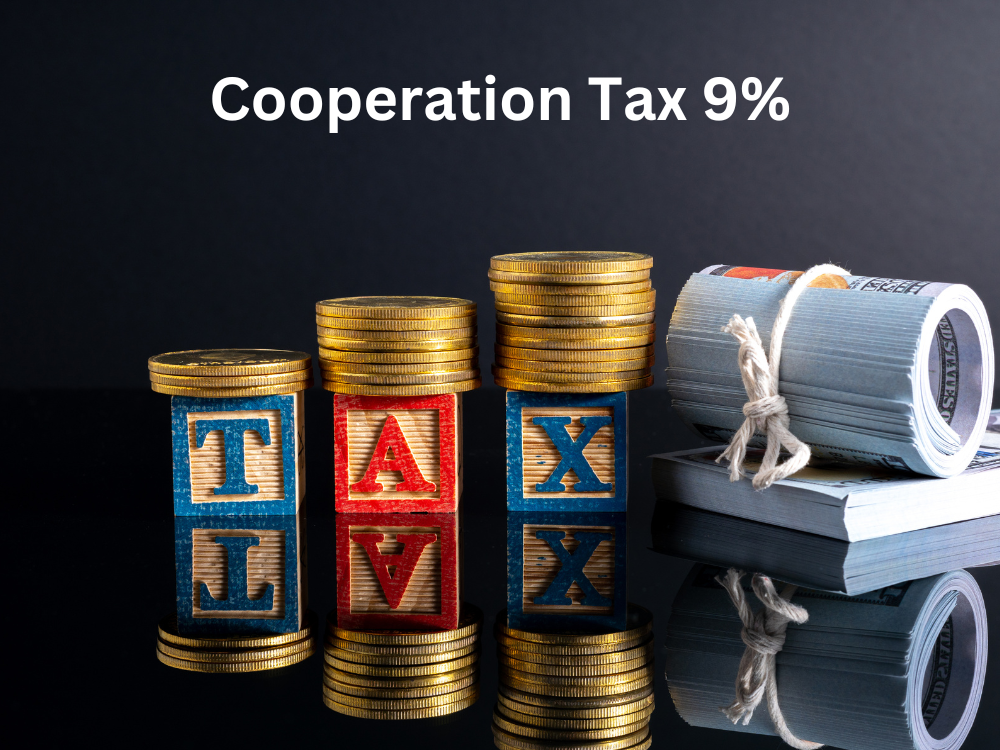Introduction to the Cooperation Tax
Attention all businesses operating in the United Arab Emirates! There’s a significant development on the horizon that you need to be aware of. The UAE government has recently introduced a new tax policy that may have far-reaching implications for your operations and finances. Brace yourselves for the implementation of the Cooperation Tax, set at 9%. In this blog post, we’ll delve into what this tax entails, who will be affected by it, how it will be calculated and paid, and much more. So grab a cup of coffee and get ready to navigate through this crucial update that could shape the future of your business in the UAE!

Reason for the Implementation of the Cooperation Tax
The implementation of the Cooperation Tax by the UAE government has been a topic of discussion and debate among business owners and economists alike. But what is the reason behind this tax policy? Why has the government decided to introduce a 9% tax on corporations operating in the country?
One of the main reasons for implementing this tax is to diversify the UAE’s revenue streams. Historically, the country has heavily relied on oil as its primary source of income. However, with fluctuating oil prices and an increasing need to reduce dependence on fossil fuels. It has become crucial for the UAE to explore alternative sources of revenue.
By introducing a Cooperation Tax, the government aims to generate additional funds. That can be invested in infrastructure development, public services, education, healthcare, and other sectors vital for sustainable growth. This move aligns with their long-term vision of creating a diversified economy that is less reliant on oil revenues.
Another reason behind this tax policy is to create a more equitable system. Where all businesses contribute their fair share towards national development. Previously, many companies enjoyed significant advantages by operating in tax-free zones or benefiting from various exemptions. The introduction of Cooperation Tax ensures that all businesses operating within UAE borders contribute proportionately based on their profits.
While some may argue against any form of taxation burdening businesses further during challenging times like these. It’s important to understand that implementing such taxes serves broader goals beyond immediate financial gains. The introduction of Cooperation Tax reflects proactive measures taken by the UAE government towards building resilient economies capable not only surviving. But thriving in an increasingly uncertain global landscape.

What Businesses Will Be Affected by the Cooperation Tax?
The implementation of the Cooperation Tax in the UAE has significant implications for businesses operating within the country. While it may seem like a blanket tax that affects all companies. There are certain criteria that determine which businesses will be impacted by this new policy.
First and foremost, the Cooperation Tax applies to all types of corporate entities. Including limited liability companies, partnerships, and branches of foreign corporations. This means that both local businesses and multinational companies operating in the UAE will be subject to this tax.
Additionally, the size of a company plays a crucial role in determining its liability under the Cooperation Tax. Large corporations with an annual turnover exceeding AED 375 million will face a tax rate of 9%. On the other hand, smaller businesses with turnovers below this threshold are exempt from this particular tax.
Furthermore, it’s worth noting that certain industries. Such as banking and finance are subject to specific regulations when it comes to taxation. These sectors may have their own unique rules or rates separate from those outlined by the general Cooperation Tax policy.
Business owners across various sectors need to understand how these changes impact their operations financially. By staying informed about who is affected by this tax and what their obligations entail, organizations can plan ahead accordingly and ensure compliance with UAE’s taxation regulations.

How Will the Cooperation Tax Be Calculated and Paid?
The calculation and payment of the Cooperation Tax in the UAE is a significant aspect that businesses need to understand. To determine the amount of tax owed, companies will need to consider their net profit for the fiscal year. This includes all income from various sources, such as sales revenue, investments, and other business activities.
Once the net profit is determined, businesses will be required to pay a fixed rate of 9% as per the new Cooperation Tax policy. This means that 9% of their net profit will be allocated towards paying taxes to the government. The tax payment should be made within specific deadlines set by authorities.
To ensure accuracy and transparency, it is essential for businesses to maintain proper financial records and documentation throughout the year. Companies must keep track of all revenue generated and expenses incurred during each fiscal period. By doing so, they can calculate their net profit accurately and fulfill their tax obligations accordingly.
To facilitate easy payment processes, businesses can make use of online platforms or authorized banking channels provided by relevant authorities. These platforms offer convenient options for submitting tax payments securely.
It’s important for companies operating in UAE to familiarize themselves with these procedures to avoid any penalties or legal issues related to non-compliance with taxation requirements.
Pros and Cons of the Cooperation Tax
The introduction of the Cooperation Tax in the UAE has sparked debates among businesses and experts. Like any new tax, it comes with both advantages and disadvantages that need to be considered.
One of the main benefits of this tax is that it will diversify the government’s revenue sources. With a heavy reliance on oil, implementing a cooperation tax allows for increased financial stability even during periods of fluctuating oil prices. This can help protect public services and infrastructure projects from being heavily impacted by economic downturns.
Additionally, the cooperation tax ensures that large corporations contribute their fair share towards nation-building efforts. By imposing a 9% tax rate on corporate profits, it helps redistribute wealth and narrow income inequality within society.
On the other hand, critics argue that such taxation may discourage foreign investment and hinder business growth. Some worry that companies might relocate to countries with more favorable taxation policies, ultimately affecting job creation in the UAE.
Furthermore, small businesses and startups may face challenges due to this new tax regime. They often operate on thin profit margins and may struggle to absorb an additional 9% tax burden without passing it onto consumers or cutting costs elsewhere.
It is important to note that every new policy comes with its own set of pros and cons. The success of the Cooperation Tax will depend on how effectively it is implemented alongside supportive measures aimed at fostering business development while also ensuring social equity.
Time will reveal whether this initiative proves beneficial for economic growth or if adjustments need to be made along the way.

Impact on Small Businesses and Startups
The introduction of the Cooperation Tax in the UAE has raised concerns among small businesses and startups operating in the country. While larger corporations may have the resources to absorb this additional tax, smaller businesses with limited budgets may struggle to adapt.
For many startups, every penny counts, and an extra 9% tax can significantly impact their financial viability. It could potentially limit their ability to invest in growth opportunities or hire more employees. This could slow down innovation and hinder job creation within the startup ecosystem.
Additionally, small businesses already face various challenges such as competition from established players and market volatility. The implementation of the Cooperation Tax adds another layer of complexity for these enterprises to navigate.
However, it’s important to note that not all small businesses will be affected equally by this tax. Some sectors that are exempted or enjoy reduced rates may find themselves relatively unaffected compared to others.
Moreover, while there might be initial setbacks for some startups due to this tax policy change, it is possible that over time they will adapt and find innovative ways to minimize its impact on their operations. They may explore cost-cutting measures or seek alternative funding sources to compensate for the increased expenses brought about by this taxation policy.
It is crucial for policymakers to consider how such a tax might disproportionately affect smaller businesses in order to create a supportive environment where entrepreneurship thrives without being stifled by excessive financial burdens.
Comparing the UAE’s Cooperation Tax to Other Countries’ Corporate Taxes
When it comes to corporate taxes, different countries have varying approaches and rates. The United Arab Emirates (UAE) recently introduced a Cooperation Tax of 9%, which has sparked interest in comparing it to the corporate tax systems of other nations.
Let’s take a look at some major economies around the world. In the United States, for example, corporations are subject to federal income tax that can range from 15% to 35%. European countries tend to have higher corporate tax rates compared to the UAE, with rates ranging from 19% in Germany to as high as 33% in France.
In Asia, Singapore is often seen as an attractive destination for businesses due to its low corporate tax rate of approximately 17%. Similarly, Hong Kong imposes a flat rate of just 16.5%. These numbers give us some perspective when comparing them with the UAE’s Cooperation Tax rate of 9%.
It’s important to note that while lower taxes may be appealing for businesses operating within the UAE, they should also consider other factors such as infrastructure development opportunities and access to markets when making investment decisions.
Each country has its own unique taxation system designed based on various economic considerations. By evaluating these differences and similarities among global jurisdictions’ corporate tax regimes alongside their overall business environment and potential benefits offered by each location, companies can make informed decisions about where they choose to invest or expand their operations.

Conclusion
The implementation of the Cooperation Tax by the UAE government has sparked mixed reactions among businesses and individuals in the country. While some view it as a necessary step towards diversifying revenue sources and ensuring financial stability, others are concerned about its potential impact on small businesses and startups.
The introduction of a 9% Cooperation Tax will have implications for various sectors, including banking, insurance, real estate, and professional services. These industries will need to carefully assess their operations and financial strategies to adapt to this new tax regime.
Calculating and paying the Cooperation Tax will require businesses to maintain accurate records of their taxable income and expenses. It is essential for companies to understand how this tax will be calculated based on their specific circumstances.
There are both pros and cons associated with the Cooperation Tax. On one hand, it can generate additional revenue for public spending on infrastructure development, healthcare, education, and other social services. On the other hand, it may increase costs for businesses operating in an already competitive market.
One concern is that small businesses and startups could be disproportionately affected by this tax due to their limited resources compared to larger corporations. The government should consider providing support measures or exemptions specifically tailored towards these entities to promote entrepreneurship and economic growth.
When comparing UAE’s 9% Cooperation Tax with corporate taxes in other countries globally, it becomes evident that different nations employ varying taxation systems according to their economic priorities. It is crucial for policy-makers in UAE not only consider international practices but also evaluate how they align with local needs while fostering investment opportunities.





